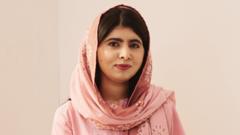Malala Yousafzai, the Nobel Peace Prize laureate known for her advocacy of girls' education and women's rights, has raised her voice against the alarming erosion of women's rights in Afghanistan following the Taliban's takeover in 2021. Having been a victim of Taliban violence herself, Malala now channels her experiences into a passionate defense of Afghan women, highlighting the drastic changes that have unfolded in a mere few years.
"I never imagined that the rights of women would be compromised so easily," Malala expressed during an interview with the BBC Asian Network, citing the hopelessness and hopelessness many girls currently endure. Since the Taliban regained control after the U.S. withdrawal—deposing a regime that had supported women's education and rights—Afghan women have faced increasingly oppressive regulations, including strict dress codes and travel restrictions that have stripped away their basic freedoms.
With over a million girls currently out of school and a significant number banned from higher education, the United Nations has condemned these "morality laws" as a form of "gender apartheid." Malala emphasizes the devastating impact these restrictions are having, especially in terms of rising child marriages and maternal health crises, stating, "Afghan women live in very dark times now."
In a bid to shed light on this crisis, Malala is the executive producer of "Bread & Roses," a documentary that highlights the struggles of three Afghan women whose rights have been systematically stripped away. The film, directed by Afghan filmmaker Sahra Mani, showcases the resilience and courage of women like Zahra, a dentist forced to abandon her practice, and activist Taranom, who fled to escape persecution.
Though the documentary's release is set for November 22 on Apple TV+, Sahra acknowledges the grave escalation of restrictions on women's freedoms over time, highlighting a critical period where some women were still able to protest for their rights. These poignant narratives reflect the shared experiences of countless Afghan women fighting for autonomy despite the overwhelming weight of oppression.
The documentary not only seeks to capture the stories of three individuals; it aims to represent the struggles of 20 million Afghan girls and women silenced by the regime. As Malala notes, it is essential for the international community to rally in support of these women, calling for more pressure on the Taliban for a restoration of women's rights and freedoms.
Despite the dire circumstances, Malala remains hopeful. "There's so much for us to learn from the bravery and courage of these Afghan women," she insists, underscoring their ongoing resistance. The female empowerment that the documentary attempts to portray is rooted in the Afghan proverb that inspired its title—asserting that true liberation comes when women are able to define their own destiny and livelihoods.
As Malala urges global support for Afghan women, she reminds us that every effort counts in the struggle for justice, "It’s our time to be their sisters and be their supporters," she advocates, a call to action that resonates beyond Afghanistan's borders.
Catch an extended interview with Malala and Sahra on BBC Asian Network on November 18 or stream “Bread & Roses” later this month for a firsthand look at the tenacity of Afghan women amidst adversity.


















